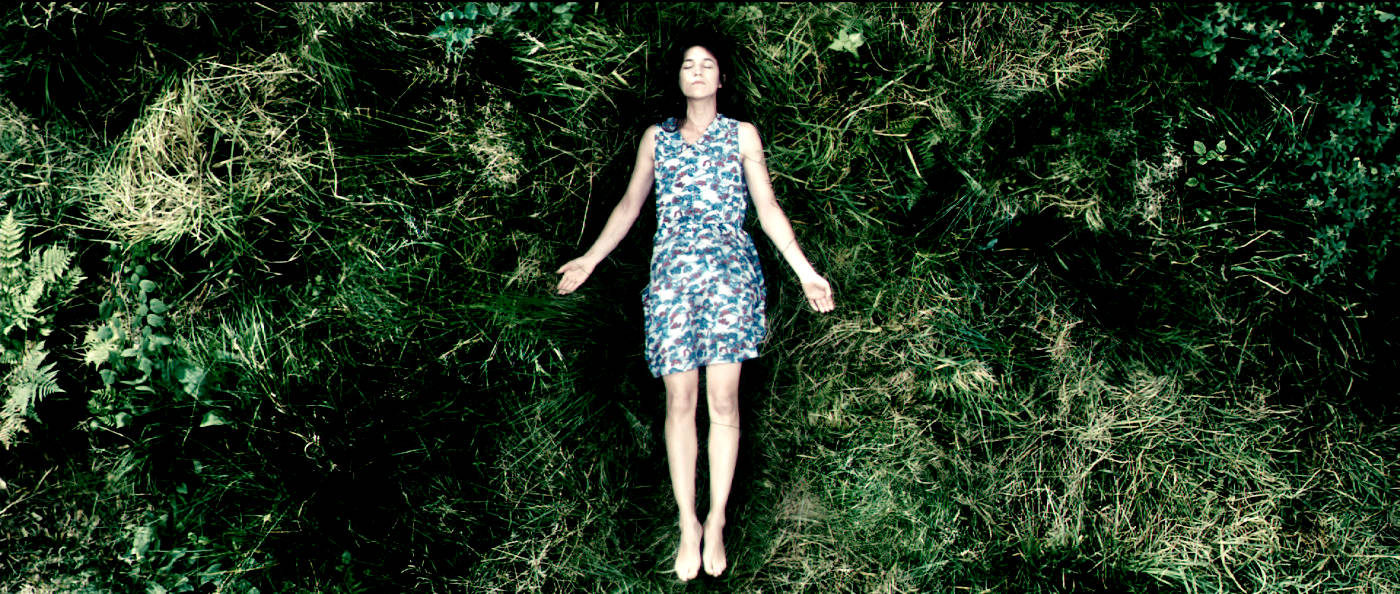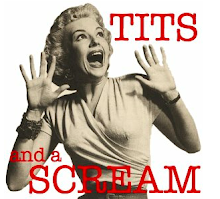"the feminine is not a monstrous sign per se; rather, it is constructed as such within a patriarchal discourse"
– Barbara Creed
As you will no doubt be aware, Lars von Trier's 2009 flirt with horror, Antichrist, found itself at the centre of quite a lot of controversy upon its release. At the core of the debates surrounding the film has been the question of misogyny: is the film as misogynistic as many critics seemed to believe, or is it "actually" just one big feminist statement? The minds of the public will probably never be made up about this, and both sides seem to have little trouble arguing a strong case with proof taken exclusively from the movie itself. While I am normally all for a gender centric analysis of horror films, it seems to me that maybe this is missing the point a bit in the case of Antichrist: when it is so obviously quite possible to to make such strong arguments on both sides, couldn't this be a sign that the whole excercise might be just a bit pointless? By all means, I'm a big fan of using movies to make a point of some sort; but this is a film that can basically "mean" anything that you might want it to. However, there's no real getting around the fact that there is a lot of talk about fear in the film. The main topic of discussion is what makes the nameless female played by Charlotte Gainsbourg, afraid – or what makes people, in general, afraid. Nature is being named as one source of horror and to me, it deals quite explicitly with the very nature of horror.
With this film, Lars von Trier seems to bring the sex back into the world of horror. Because in recent years, it has become less and less essential to the horror genre, as far as I can tell. It is now mostly about the torture, as discussed in my previous post, and the focus has been removed almost entirely from the sex which was always a major source of horror in the past. Look at Psycho: you don't witness any sex acts actually taking place on screen, yet still the entire film is absolutely chock-full of it. Marion and Sam get dressed in the hotel room; you see Marion in her underwear several times and obviously naked in the shower; Norman was aroused by Marion (according to the psychiatrist in the final scene), etc etc etc. Now, even something like Hard Candy (2005), which is in its own way all about sex, doesn't show any actual sex take place. In Antichrist though, there is LOTS of it, and it is very detailed. As anyone with even the vaguest interest in traditional horror films will know: bad things happen to people who have sex. Especially sex of the more irresponsible kind, and what could be more irresponsible than to let your child fall to his death while you are busy lovemaking?
When I was watching the film for the first time a couple of weeks ago, it took me a good half hour or more to try and figure out what on earth I was even watching (and I've been led to believe that a lot of people never do figure that one out). I had heard and read so much about how Antichrist was a horror film. For a while, I didn't see much to back up this statement. Sure, lots of psychological stuff, some of it quite creepy. But enough to make it a horror film?
After a while, though, I realised just how much of a horror film this is. Maybe even more so than most of the ones we like to call classics, or essential, or just traditional scary movies. Because here is a film that is about fear and about horror, rather than just trying to scare its audience with a man in a mask and making us jump when he appears out of nowhere and kills some people. (A film's "quality as horror film", says Carol Clover, "lies in the ways it delivers the cliché".) For me, some of the conversations that the nameless couple lead are sufficient "proof" of this. And I will now go on to provide you with some valuable quotes from said conversations:
Before leaving for Eden, He tries to find out what She is really afraid of:
H: Let's make a list of things that you are afraid of.
S: But I don't know what I'm afraid of … Can't I just be afraid without a definite object?
Later, one evening at Eden, they do a little "therapeutic" excercise, in the form of a role play (this is after He has placed "nature" at the top of She's "fear pyramid"):
H: My role is all the things that provoke your fear. Yours is rational thinking. … I'm nature. All the things that you call nature.
S: What do you want?
H: To hurt you as much as I can.
S: How?
H: How do you think?
S: By frightening me?
H: By killing you.
S: Nature can't harm me. You're just all the greenery outside.
H: No... I'm more than that.
S: I don't understand.
H: I'm outside, but also... within. I'm the nature of all human beings.
S: Oh, that kind of nature. The kind of nature that causes people to do evil things against women?
H: That's exactly who I am.
And finally, about She's research for her thesis on gynocide:
S: If human nature is evil, then that goes as well for the nature of...
H: ...of the women?
S: The nature of all the sisters. Women do not control their own bodies. Nature does. I have it in writing in my books.
H: The literature that you used in your research was about evil committed against women, but you read it as proof of the evil of women?
It is difficult to even know where to begin with this. I have watched these scenes twice now and each time a hundred different thoughts have popped into my head, but I will try to make it as short and as relevant as possible. It is made clear from these excerpts that we are in fact dealing with the kind of irrational fear that most horror films do indeed play upon. Ie., we know fully well that Freddy isn't going to slice us open as we sleep, but we still fear it. Notice how it is made very clear that there is a mutually exclusive opposition between rationality and fear. I think it's also really interesting that they bring up the idea of being afraid, but not because of something specific. Most horror films will have a specific object of fear; however, they will inevitably depend upon the ability of the viewer to be genuinely afraid of something that is not in fact dangerous to them in any real way. Furthermore, there is, of course, talk of women. I'm not, after all, trying to deny that there are gender issues being somehow or other adressed, or at least pointed out, in this film. What I do think about it though, is that rather than von Trier trying to make some statement about these things, be it a misogynistic or a feminist one, he is simply pointing out that this is a major issue in horror tradition. The nature of women, and the nature of men (or, as She aptly puts it, "people". Who are "people", historically speaking?).
There is at least one other blogger who somewhat agrees with me on this, saying that "Ultimately, I think he's making a horror film that suggests misogyny is at the core of all horror films and religious parables. Actually, to go even further, I think his attack is on the misogynist underpinnings of western rationalism as such."
And let's not at any point forget that there is one person here to represent rationality and science, and another to represent wildness, raw nature, and even evil. That the former is male and the latter is female is not, I believe, because von Trier believes that this is a true and accurate representation of the genders as such: rather, he is only pointing out what traditional horror has been doing for decades, if not centuries.
Another thing that has been very present in many a modern horror film, and especially in the many theories and criticisms surrounding them, is of course Freudian theory. Barbara Creed's essay Horror and the Monstrous-Feminine is the place to start if you are interested in looking into this. In the essay, Creed quotes Freud as saying that the Uncanny is "something which ought to have remained hidden but has come to light". There seem to be many things in Antichrist to which this description can easily be applied. Most of all, though, it seems to me to be certain elements of human nature that ought to have remained hidden, if you follow the logic of the film. Not only the evil female nature, which admittedly gets paid the most attention: even the big protector of rationality in the film ends up performing what can only be described as unhumane acts. For once though, I don't want to give away the ending. Anyway, Freud and that: again, so many things to choose from, and I'll settle for mentioning some of the most obvious things. There is a mother – father – son motif turned more or less on its head; there is the fox hole and the "thick" trunk right next to it; He tries to hide in the fox hole when She is chasing him, only to be buried alive in it. This happens after She has practically castrated him, and before she "practically" castrates herself (who says women can't be castrated?). Earlier in the film, after her psychiatrist husband has told her about having some odd dreams, She tells him that dreams don't matter to modern psychology: "Freud's dead, isn't he?"
I want to return to He's attempts to rationalise She's fear. He tells her in the early stages of the film that "grief is natural". He tries to make her realise that the things that she fears are not actually dangerous, and he does this at first by seemingly hypnotising her and making her go into Eden, lying down on the grass and "melting into the green". By doing this, he is almost forcing her to become part of the thing that she fears the most: nature. She is convinced that nature is evil, and when she is forced to be part of nature, she becomes "evil". She clearly believes in the ability of his words to become reality; this is illustrated through one of their discussions about her thesis, when She accuses him of finding her subject "glib". She admits to never having finished her thesis, saying that "all of a sudden, it was glib". If this is the logic we are to follow, it might well be that He makes his biggest fatal mistake (other than claiming, in the role play mentioned above, to be all of the things that she is afraid of...) when he tells her that "your thoughts distort reality. Not the other way around". Her thoughts, her way of seeing the world, do indeed distort and change reality for both of them.
He believes that She is suffering from anxiety, and tries to persuade her that "anxiety can't make you do something that's against your nature". In response, she certainly does her best to convince him of the true nature of, well, nature. And finally, in yet another attempt to rationalise, He tries to explain to her that "obsessions never materialise. It's a scientific fact". Ironic, then, that her obsession with gynocide influences him to put an end to it all in the specific way that he does.
(I have a feeling that I might return to this one.)




